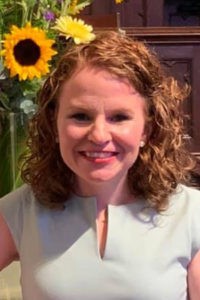This weekend, I have found strength and solidary in the words of Galatians 5: “Stand firm, therefore, and do not submit.” In this same chapter, we are told that it was for freedom that Christ has set us free. All of us, free.
I don’t know anyone whose life embodied this text better than Fannie Lou Hamer, a Baptist woman who helped lead the way in the Civil Rights movement.

Mary Alice Birdwhistell
Hamer was born in Montgomery County, Miss., in 1917, the youngest of 20 children. Her parents were sharecroppers in the Mississippi Delta, and she began working in the fields when she was only 6 years old. She always loved to read, especially poetry, and she was excellent at spelling. However, at the age of 12, Hamer dropped out of school in order to work full time to help out her family.
Fannie went on to marry another sharecropper, Pap Hamer, and together they worked on a plantation for 18 years. They later adopted four children. Fannie had not been able to become pregnant because like many other Black women at that time, she had been sterilized without her knowledge or consent. In 1961, while she was in the hospital for what was supposed to be a minor surgery, she was also given a hysterectomy. This practice was so commonplace among Black women that it became known as the “Mississippi appendectomy.”
“Fannie had not been able to become pregnant because like many other Black women at that time, she had been sterilized without her knowledge or consent.”
“I would say that about six out of the 10 Negro women that go to the (North Sunflower County) hospital are sterilized with the tubes tied,” she later told a group in Washington, D.C. This horrific experience of was one of the defining moments that ultimately led her to engage in the Mississippi Civil Rights movement, according to PBS.
In the summer of 1962, Fannie attended a church meeting that would change the course of her life, and the course of history. That night, she heard from other civil rights leaders who wanted to help Black citizens fight for their right to vote. She said it seemed like “the most remarkable thing that could ever happen in the state of Mississippi.”
And so, Fannie responded to an altar call that night, along with 16 other people, and they soon loaded a bus to try to register to vote at a nearby courthouse. Fannie led the group in singing “This Little Light of Mine” and “Go Tell it on the Mountain” all along the way.
They were turned away that day, facing brutal opposition from both local and state law enforcement and not permitted to register to vote. And Fannie’s bravery came at a significant cost. She lost her job and was kicked out of the plantation she had called home for 20 years. But firing Fannie backfired. She later was quoted in the New York Times saying, “When they kicked me off the plantation, they set me free. It’s the best thing that could ever happen. Now, I can work for my people.”
“When they kicked me off the plantation, they set me free. It’s the best thing that could ever happen.”
Fannie would go on to be arrested, jailed, beaten and held at gunpoint. She was severely injured in 1963 in a Winona, Miss., jail where she and two other activists were taken in by police after attending a voter registration training workshop. She was beaten so badly that she suffered permanent kidney damage.
But she never stopped fighting for freedom. In one of her very first speeches, in Greenwood, Miss., she said, “Do you know why I love the song ‘This Little Light of Mine’ from the fifth chapter of Matthew? (Jesus) said, ‘A city that’s set on a hill cannot be hid.’ And I don’t mind my light shining; I don’t hide that I’m fighting for freedom because Christ died to set us free.”
You see, these very words from Galatians were Fannie Lou Hamer’s motivation. These very words are what sustained and strengthened her throughout her fight for freedom. And perhaps these are the words that will sustain you and me, too.
At the end of her speeches, Hamer would often say to her audiences, “I don’t want to hear you say, ‘Honey, I’m behind you.’
“Well, move,” she would say to them, “I don’t want you back there. Because you could be 200 miles behind. I want to hear you to say, ‘Honey, I’m with you.’ And we’ll keep going up this freedom road together.”
Mary Alice Birdwhistell serves as pastor of Highland Baptist Church in Louisville, Ky.
Related articles:
America 2021: ‘Illegalizing’ dissent? | Opinion by Bill Leonard
Voting rights and the ninth commandment | Analysis by Stephen Reeves

